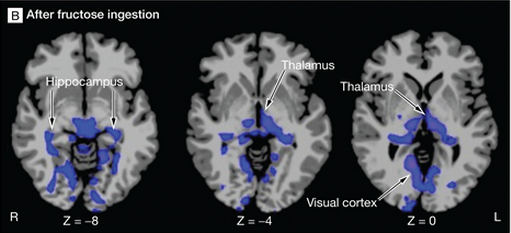 When binge eating, some people don't notice feelings of fullness or eat well beyond satiety. While there are many psychological factors that can explain this, a new study suggests that the interaction between certain food ingrediants and the brain may affect appetite control.
When binge eating, some people don't notice feelings of fullness or eat well beyond satiety. While there are many psychological factors that can explain this, a new study suggests that the interaction between certain food ingrediants and the brain may affect appetite control.
The study was released online yesterday in the Journal of the American Medical Association (JAMA). While the researchers did not specifically examine binge eating or bulimia, their findings may relate to these eating disorders.
In the study, researchers compared brain images in 20 adults who consumed beverages with either fructose sugars or glucose sugars. They found that after drinking glucose sweetened beverages, there was less blood flow and activity in areas of the brains associated with appetite regulation. People also reported feeling more full after drinking the glucose beverages.
In contrast, drinking the beverages with fructose failed to reduce activity in the same brain areas (hypothalamic region). In other words, drinking beverages with fructose failed to activate the brain areas that we associate with feeling full.
This may help explain why some people continue to feel hungry and eat after consuming foods with fructose. Two of the study authors, in an accompanying JAMA editorial, write that "these findings support the conceptual framework that when the human brain is exposed to fructose, neurobiological pathways involved in appetite regulation are modulated, thereby promoting increased food intake."
Fructose is found in many processed foods which have high fructose corn syrup, the same foods people often report consuming when they are binge eating. This study may offer some biological explanation for overeating, but of course binge eating and bulimia also involve many other complex psychological issues. The study also raises new questions on the relationship between foods and satiety - for example, would similar brain patterns be shown with different types of sugary foods (vs beverages), and how would the same brain areas be activated after an episode of binge eating?
Have comments or questions? Discuss them on the facebook page or contact Dr. Gupta directly
Dr. Gupta is a professor at Barnard College of Columbia University and provides individual therapy at Tribeca Psychology
Stay up to date on the latest research: Follow the blog on twitter, like on facebook, or subscribe.
You may also be interested in reading:
Is your brain wired to make you crave food when you're sad?
How anxiety and pefectionism influence binge eating and dieting